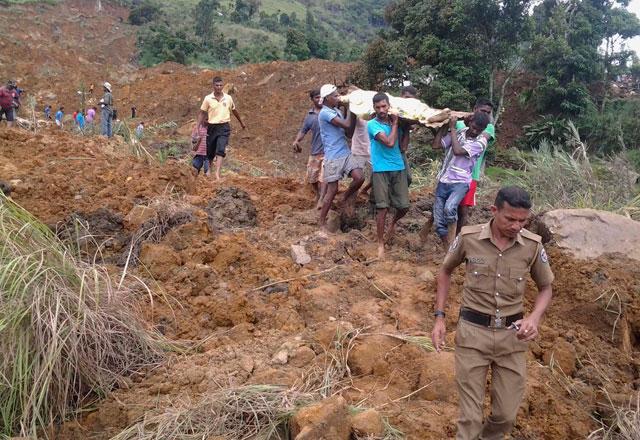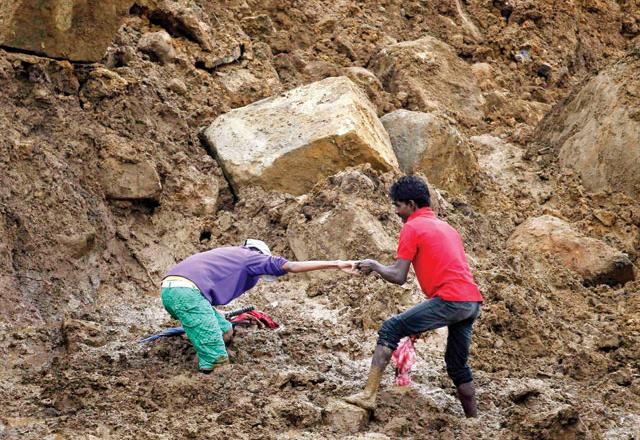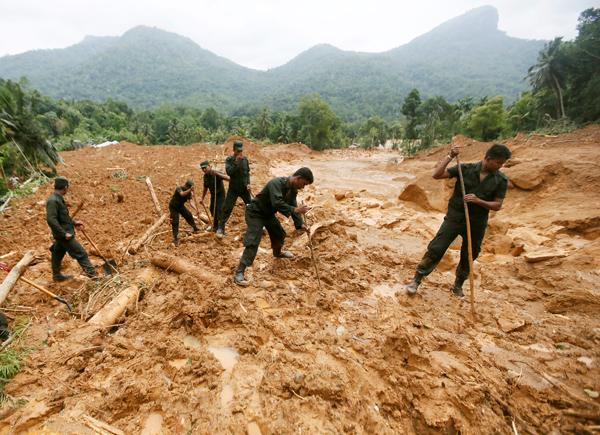You are here
Around 100 buried alive in Sri Lanka tea region mudslide — minister
By AFP - Oct 29,2014 - Last updated at Oct 29,2014

KOSLANDA, Sri Lanka — Around 100 people were buried alive in a tea-growing region of Sri Lanka Wednesday as mudslides triggered by monsoon rains washed away their homes on a plantation, disaster officials said.
One witness spoke of hearing a noise like thunder as part of a mountainside collapsed onto the estate, burying some of the workers' homes in nine metres of mud and debris.
"What I gathered is that about 100 people have been buried alive," Disaster Management Minister Mahinda Amaraweera told AFP after visiting the site in the eastern Koslanda region.
"There is no chance they could have survived," said the minister, as other officials said 16 people were confirmed dead.
Hundreds of soldiers, who initially used their hands to dig for survivors, had switched to operating excavators by evening but hopes had faded of finding anyone else still alive.
"Anyone buried under the mud has a very slim chance of surviving," disaster management centre spokesman Sarath Kumara told AFP.
The annual monsoon brings vital rains for irrigation and electricity generation but also causes frequent loss of life and damage to property.
The minister said the search and rescue mission led by troops had now turned into a recovery operation, which they hope to resume at first light on Thursday.
He said using heavy machinery also had to be done carefully because the surrounding hills were unstable.
"Initially we estimated the missing number at 300, but most of them were at school or work," the minister said.
"We have already started relief operations to provide them with shelter and food.”
"Even the office where records were kept had been damaged," the minister said.
The region's top military official, Major General Mano Perera, said 302 people, including 75 schoolchildren, whose homes were destroyed in the mudslide were being looked after at two schools in the same area.
The mudslide hit at a time when most people were at work and children were already in school, leaving the elderly and the very young at home.
The military officer said about 500 troops had been deployed in the area to carry out the search for victims.
Kumara said 16 bodies have so far been recovered from the disaster around 200 kilometres east of the capital Colombo.
"We have reports of 140 houses getting washed away in the mudslides," Kumara added.
Part of a mountain appeared to have collapsed onto the cluster of homes belonging to the tea plantation workers and their families below, leaving no trace of them, an AFP photographer at the scene said.
Homes washed away
Shopkeeper Kandasamy Prabhakaran, 34, said he heard a noise like thunder and then saw houses being washed away by tonnes of mud.
"Right before my eyes I could see houses crumbling and getting washed downhill," Prabhakaran said.
"It all happened very quickly."
President Mahinda Rajapakse ordered troops to deploy heavy equipment to speed up the rescue efforts, his office said.
Military sources said they expected more heavy machinery to reach the site, but damage to roads as well as heavy rain and mist were slowing them down.
Sections of several national highways have also been washed away by the rains and a train was stuck after a mountain slope crashed onto a railway line.
The landslide began at about 7:45am (0215 GMT) and lasted about 10 minutes, Perera said, adding "some houses have been buried in 9 metres of mud".
Authorities have begun checking on the number of people who were in their homes when tragedy struck.
Kumara said the mudslide struck after schools opened and tea plantation workers were supposed to be at work, but bad weather may have prompted some to stay home.
The area is prone to mudslides and residents had been repeatedly warned to move to safer areas as monsoon rains lashed the region, the disaster management centre said.
Thirteen people were killed in mudslides in and around Colombo in June.
Cyclonic winds that accompanied the monsoon in June last year killed 54 people, mostly fishermen.
Related Articles
Hundreds of desperate Sri Lankan villagers dug with barehands through the broken red earth of a deadly landslide Thursday, defying police orders after a top disaster official said there was no chance of finding more survivors at the high-elevation tea plantation.
ARANAYAKA, Sri Lanka — Hopes faded on Thursday for the survival of about 130 people trapped under the mud and rubble of two landslides in Sr
AMMAN — Work is under way to establish a Sri Lankan-Jordanian Business Council to enhance bilateral economic and trade cooperation, Sr
















